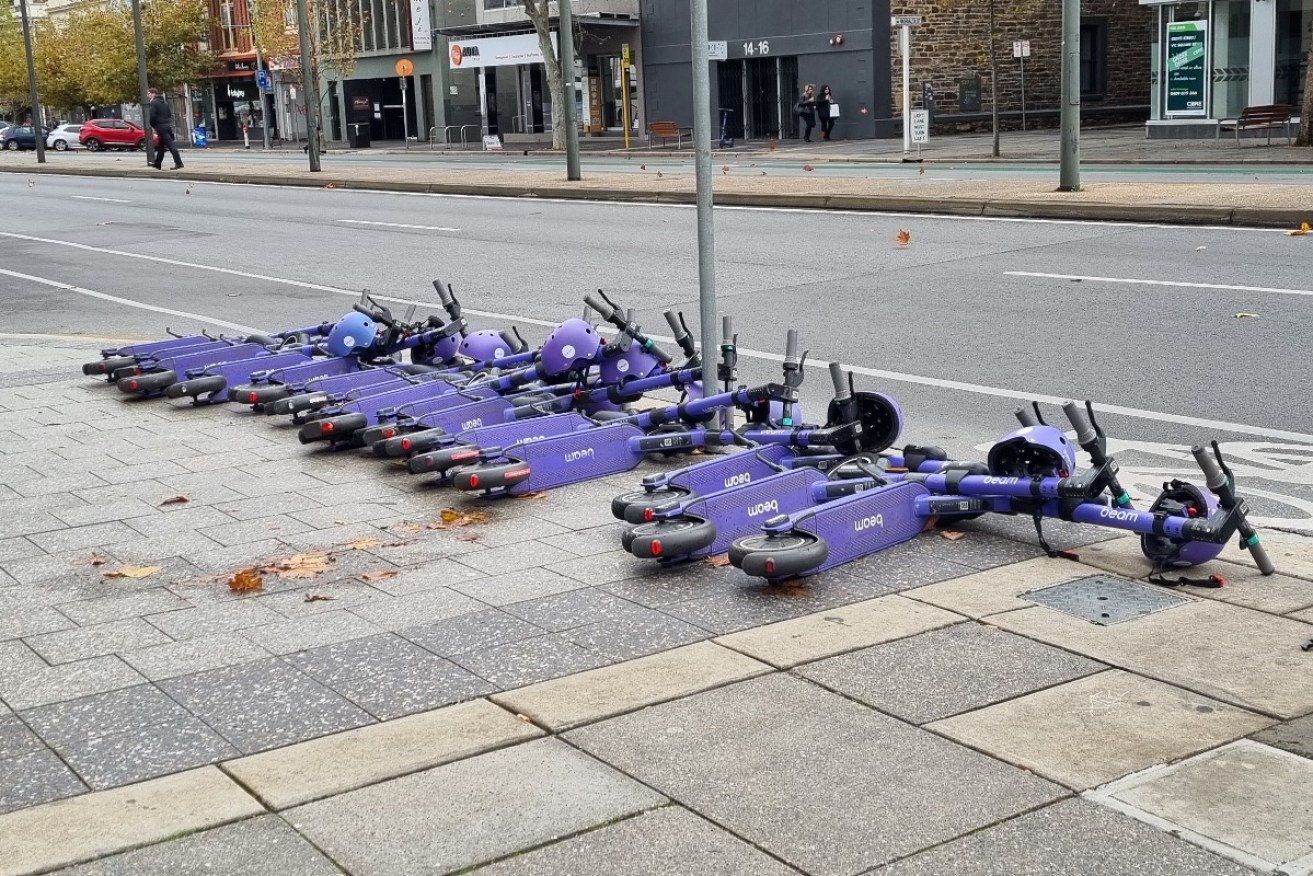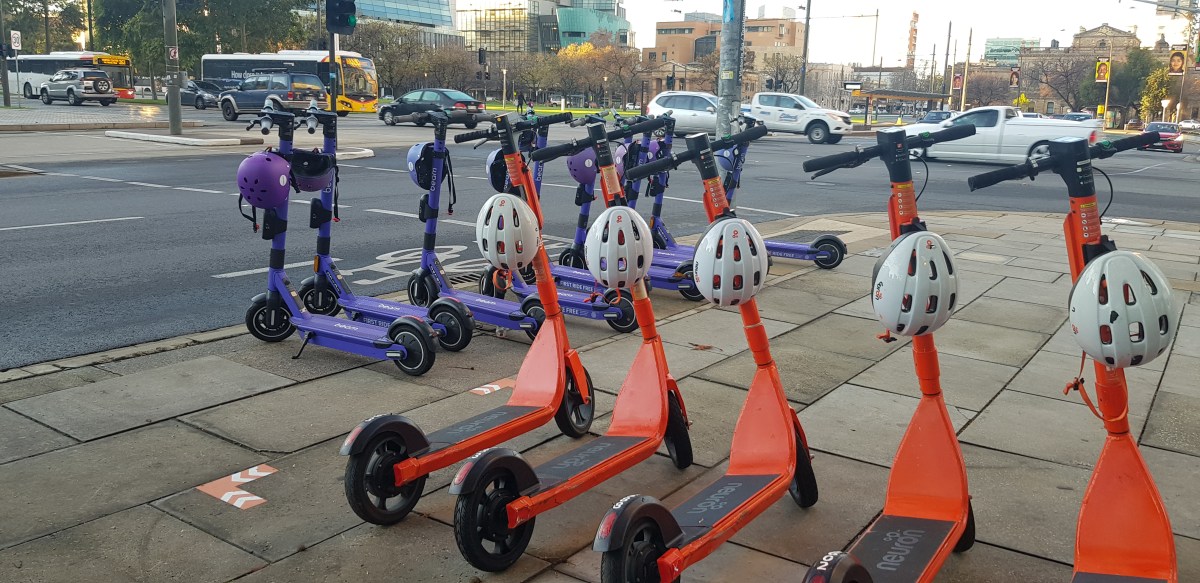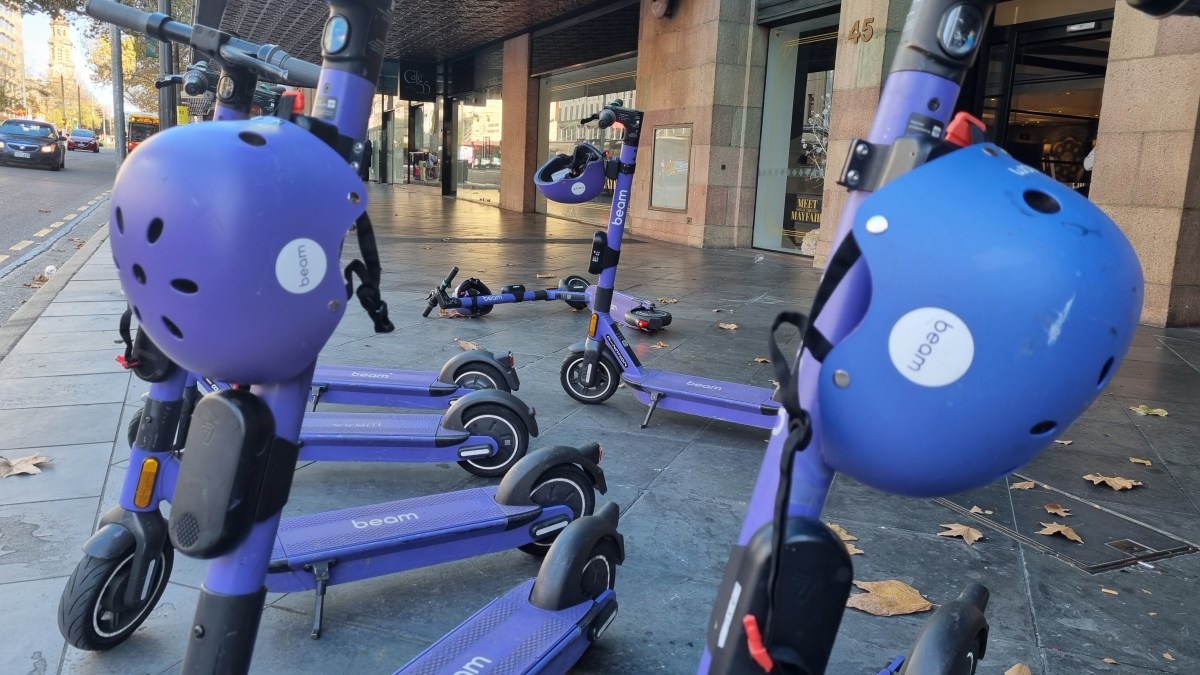South Australia’s e-scooter laws might not change until 2025
Long-awaited government legislation to legalise e-scooters may not come into effect until early 2025 despite a five-year ongoing trial, Adelaide City Council claims, as it considers whether to give another extension to their use in the CBD.


Legislation is being introduced to Parliament which would legalise private e-scooters. Photo: Thomas Kelsall/InDaily
The state government promised to introduce legislation in the middle of this year to legalise the use of private e-scooters on the state’s roads and footpaths, following public consultation in 2023 that was broadly supportive of micro-mobility.
In the interim, the government continues to grant temporary extensions to councils running e-scooter trials.
Currently, only e-scooter companies – the purple Beam fleet and the orange Neurons – are legally allowed to operate on footpaths in council areas that have a government-approved trial.
Adelaide City Council has been running an e-scooter trial since February 2019 and has repeatedly asked the state government to extend the trial while it awaits legislation.
The council has since become increasingly frustrated waiting for the government to draft new laws, with Lord Mayor Jane Lomax-Smith telling InDaily today that “we’ve reached the end of our tether with these extensions and it needs to be resolved so we can say something final and decisive to the operators”.
In May 2023, councillors passed a motion authorising the Lord Mayor to request a further e-scooter trial extension until April 30, 2024 and inserted an amendment specifying this would be the “final” extension.
But councillors will today discuss whether to ask for yet another extension beyond April 30.
In an agenda note prepared for councillors this week, council administration said they had been advised that e-scooter and personal mobility device laws might not change until “early 2025”.
“The timeframe for changes to existing Acts and/or Regulations is unconfirmed, but advice from the Department for Infrastructure and Transport (DIT) is that this will take over 12 months, so will be unlikely to occur until early 2025,” the note states.
“It is recommended that Council authorise the Lord Mayor to write to the Minister for Infrastructure and Transport to request an extension of the trial for a further 12 months… (to 30 April 2025).
“This will allow e-scooter operations to continue in CoA whilst the State Government shared e-scooter trial and wider micromobility review is completed and legislative changes are made.”
Council administration also suggested the Lord Mayor be authorised to tell the state government that “the trial has now taken five years and that legislation must be forthcoming”.

E-scooter companies Beam (purple) and Neuron (orange) pay a weekly $1,622.30 permit fee to Adelaide City Council to operate in the CBD. Photo: Thomas Kelsall/InDaily
InDaily asked Transport Minister Tom Koutsantonis’ office about the early 2025 timeframe. In response, a government spokesperson said the government expects to introduce legislation in the middle of the year.
“It’s a matter for the parliament how quickly it is passed,” the spokesperson said.
Opposition transport spokesperson Vincent Tarzia urged the government to move faster on legislation.
“It is ridiculous that we are still talking about e-scooter trials five years on and now we discover this will continue well into 2025 when we know they are popular and already used by so many South Australians – but in many cases illegally, and Tom Koutsantonis refuses to still legalise the devices,” he said.
“The Liberal Party introduced legislation in February 2023 to make e-scooters legal and the Malinauskas Labor Government continues to ignore this sensible and much-needed reform.”
Meanwhile, rental e-scooters are no longer operating in the City of Unley, following a council decision not to ask for a further trial extension beyond February 14, 2024.
The City of Unley e-scooter trial had been operating since February 14, 2022. A vote on extending the trial for a further year was lost six votes to five, amid councillor and community concerns about scooters cluttering footpaths and pedestrian safety.

E-scooter clutter on footpaths has been a recurring complaint received by councils. Photo: Thomas Kelsall/InDaily
Two “collision incidents” involving e-scooters have been reported in the City of Unley between December 1, 2022 and November 30, 2023.
The first involved a person tripping over an e-scooter at night and injuring themselves, while the second involved a person falling from an e-scooter, according to council documents.
In the City of Adelaide, there were 14 reported e-scooter “injury incidents” in 2023, 10 of which were rider only and four involved a third party.
Three of the rider injuries required medical treatment, while one of the third-party incidents required a trip to hospital.
Data supplied by Beam and Neuron to the council shows that Friday and Saturday nights are the most popular times for e-scooter usage in the city.
There were nearly 640,000 e-scooter trips – an average of more than 1750 trips a day – in the City of Adelaide last year.
Two other councils, the City of Norwood Payneham and St Peters and the City of Charles Sturt, operate e-scooter trials.
E-scooters in Charles Sturt can only operate along the coast from West Beach to Semaphore Park. That trial is due to end on October 31, 2024, while the Norwood one expires on December 31, 2024.




